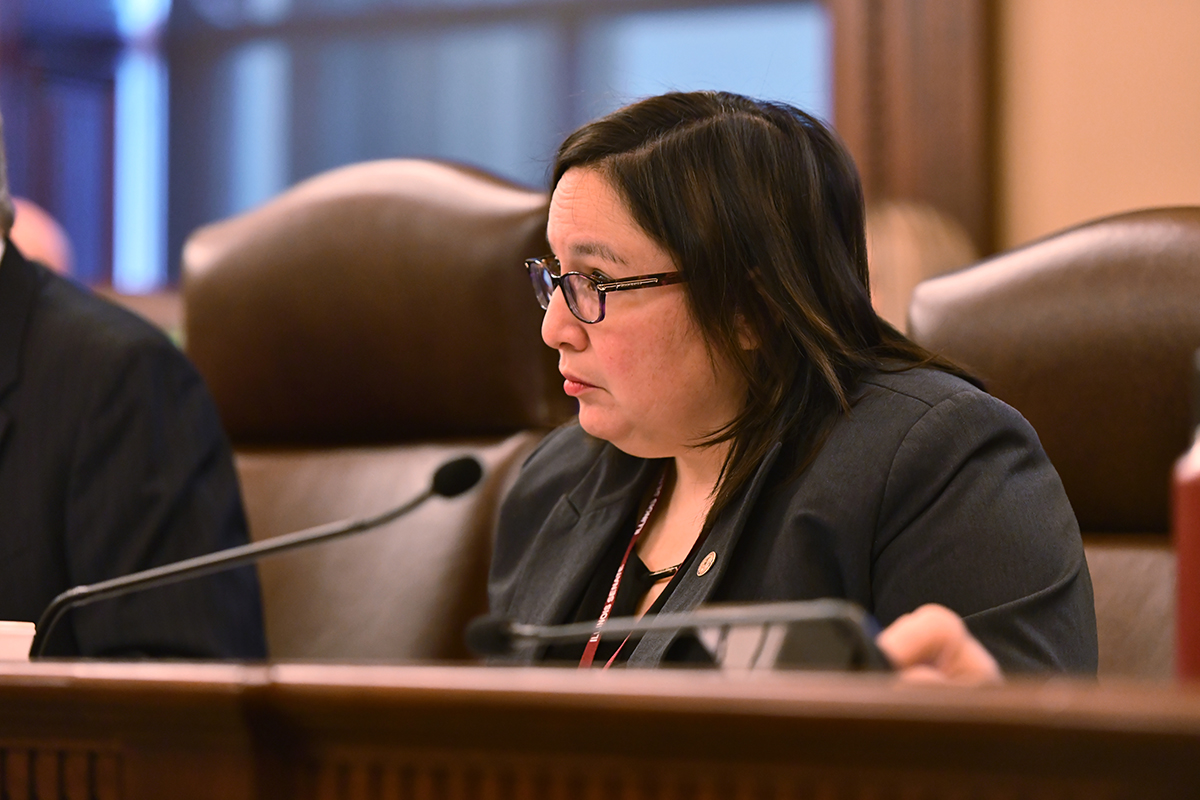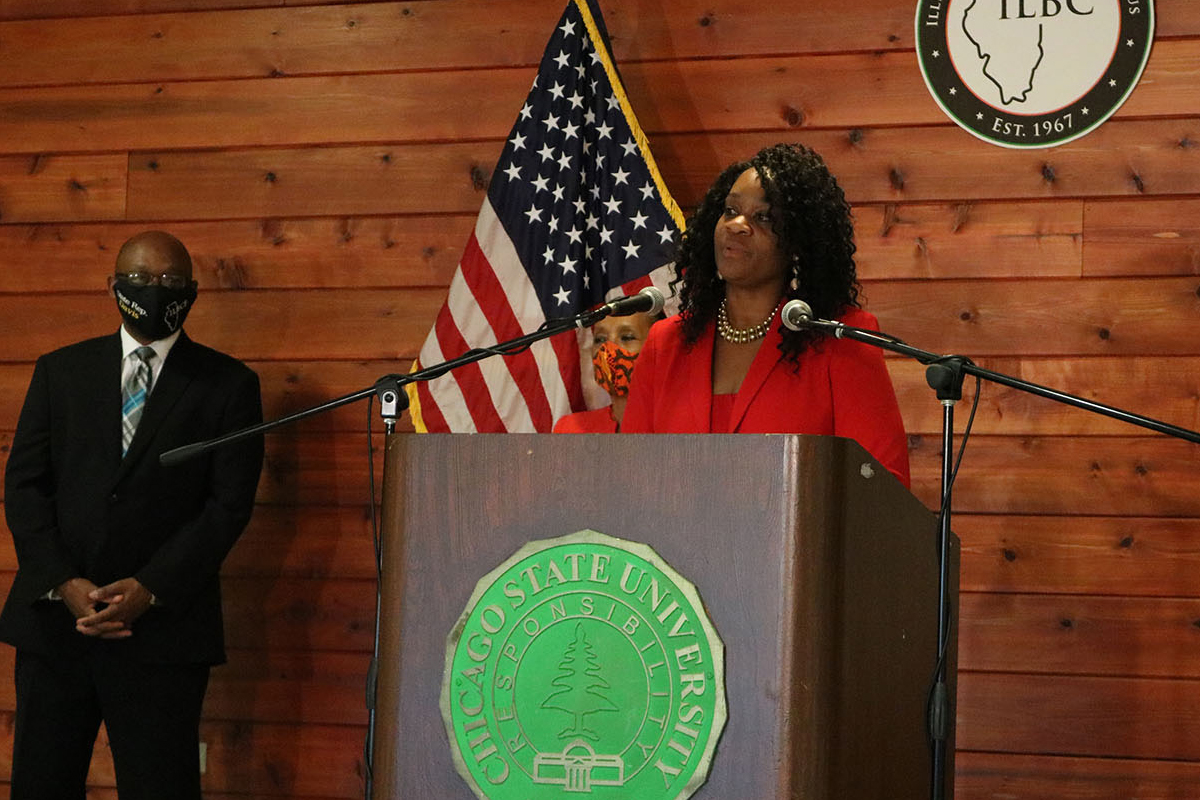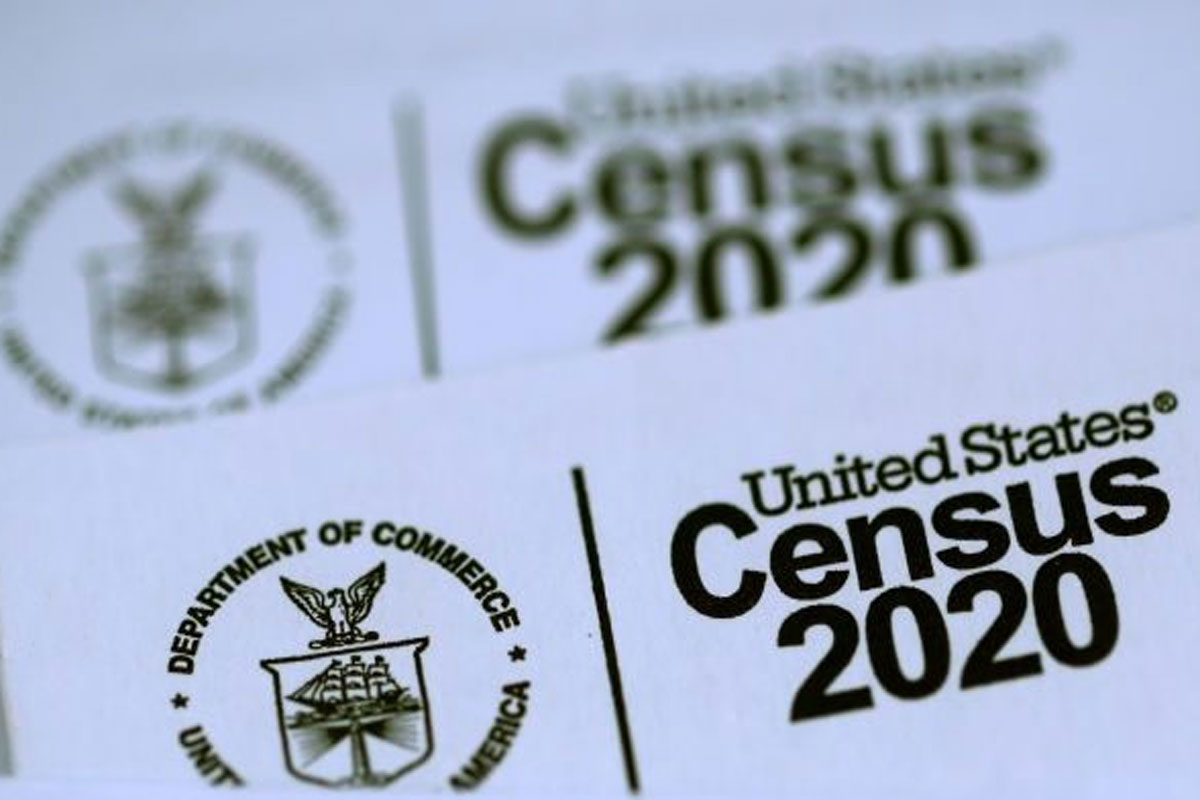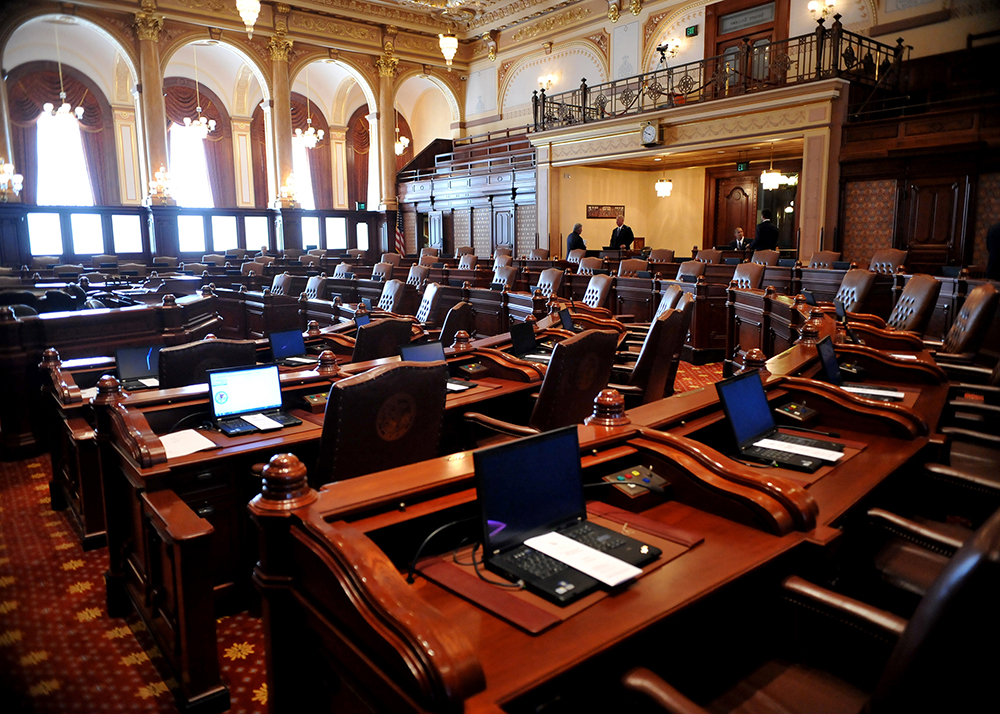- Details
- Category: Senator Melinda Bush News
 GRAYSLAKE – As the COVID-19 pandemic continues to accentuate inequalities in access to technology throughout Lake County and the entire state, Senator Melinda Bush (D-Grayslake) is highlighting that 15 Lake County-based schools have been selected to receive part of $80 million to close the digital divide.
GRAYSLAKE – As the COVID-19 pandemic continues to accentuate inequalities in access to technology throughout Lake County and the entire state, Senator Melinda Bush (D-Grayslake) is highlighting that 15 Lake County-based schools have been selected to receive part of $80 million to close the digital divide.
“No student should have to miss out on learning because they don’t have the proper technological resources to participate in e-learning,” Bush said. “I am pleased to learn 15 Lake County schools have received funds to close the digital divide and give every student a chance to succeed – regardless of financial situation.”
Nearly 500 schools across the state received a total of more than $80 million to help ensure all students have reliable access to the technology they need for remote learning. The money comes from the Digital Equity Formula Grant, which was funded by the federal Coronavirus Aid, Relief, and Economic Security Act. The grant allocated funding to the highest-need communities in the state to provide important e-learning resources to low-income families.
Schools can use the grant to purchase additional devices and connectivity or to cover purchases made since the onset of the pandemic on March 13.
For more information about COVID-19 and education, visit isbe.net/covid19.
- Details
- Category: Senator Rachelle Crowe News
 GODFREY – To support organizations working on the front lines against the COVID-19 pandemic, State Senator Rachelle Crowe (D-Glen Carbon) donated 5,000 disposable masks to nursing homes and assisted living facilities throughout the Metro East.
GODFREY – To support organizations working on the front lines against the COVID-19 pandemic, State Senator Rachelle Crowe (D-Glen Carbon) donated 5,000 disposable masks to nursing homes and assisted living facilities throughout the Metro East.
“The safety of older residents and their caretakers is one of the utmost concerns nationally amid the COVID-19 pandemic,” Crowe said. “As I considered how best to distribute masks, it was important for me to give priority to individuals at the highest risk for infection.”
All nursing homes and assisted living facilities in the 56th District were sent a letter from Sen. Crowe’s office encouraging requests, and the first eight facilities to respond received 625 masks each. The list of facilities includes:
- Burt’s Shelter Care Home in Alton,
- Evergreen Place in Alton,
- Caseyville Nursing in Caseyville,
- Stillwater Senior Living in Edwardsville,
- Asbury Village in Godfrey,
- Morningside of Godfrey,
- Integrity Health Care in Godfrey and
- Fountain View Memory Care in Granite City.
The mask distribution was made possible by Friends of Taiwan and TECO of Chicago.
“Thank you to Friends of Taiwan for the gracious donation and TECO of Chicago for facilitating, as the masks will benefit some of our most vulnerable in Madison County,” Crowe said.
Pictured from left to right: Administrator of Asbury Village Anita Martinez, Sen. Crowe’s grandmother and Asbury resident Eilene Taylor, and State Senator Rachelle Crowe.
- Details
- Category: Senator Patrick Joyce News
 KANKAKEE, IL - State Representative Lindsay Parkhurst (R-Kankakee) and State Senator Patrick Joyce (D-Essex) reacted to an announcement from the Illinois Department of Natural Resources today that the Kankakee State Park Potawatomi campground is scheduled to reopen October 1. The two legislators worked together closely to cut through red tape of multiple state agencies to get the project completed so the campground, shuttered since 2015 amid a lack of capital funding to complete needed renovations, can finally reopen to the public.
KANKAKEE, IL - State Representative Lindsay Parkhurst (R-Kankakee) and State Senator Patrick Joyce (D-Essex) reacted to an announcement from the Illinois Department of Natural Resources today that the Kankakee State Park Potawatomi campground is scheduled to reopen October 1. The two legislators worked together closely to cut through red tape of multiple state agencies to get the project completed so the campground, shuttered since 2015 amid a lack of capital funding to complete needed renovations, can finally reopen to the public.
Representative Parkhurst stated, “The Kankakee River State Park is a treasure we need to maintain and protect. I worked and fought for progress on getting both the Potawatomi and Chippewa campgrounds open since taking office in 2017 despite road blocks and administrative red tape at every turn. When Senator Joyce was appointed, I asked for his cooperation and support in this battle and he gladly accepted. We both have deep roots in this community and are happily and successfully working together, despite all the partisan politics in our state, to improve the 79th District. We care about our community and it took both of us, on both sides of the aisle, to accomplish the opening of the campground. Great things can happen when you put community, not politics, first. We will continue to work together to reopen the Chippewa campground.”
Senator Joyce stated, “During my time representing this district, I have worked tirelessly to ensure this remarkable resource is available to residents across this region. I am proud of the bipartisan work Representative Parkhurst and I accomplished to bring this campground to the people we represent. The park is a community staple that I am happy folks will have access to utilize and enjoy. As we kick off the fall season and more families are choosing to travel locally during the pandemic, the timing for the opening of the Kankakee State Park Potawatomi Campground could not be more perfect. We will all continue work together to get Chippewa campgrounds open next.”
For questions or more information, please contact or Representative Parkhurst’s office at (815) 523-7779 or online at repparkhurst.com or contact Senator Joyce’s office at (708) 756-0882 or online at senatorpatrickjoyce.com.
- Details
- Category: Senator Linda Holmes News
 On Friday, September 18, the United States lost its petite powerhouse in the Supreme Court, Justice Ruth Bader Ginsburg.
On Friday, September 18, the United States lost its petite powerhouse in the Supreme Court, Justice Ruth Bader Ginsburg.
Ginsburg died at her home in Washington, D.C., surrounded by family. She was 87 and succumbed to complications of metastatic pancreatic cancer after multiple rounds with the disease.
In reaction to news of her loss September 18, members of the Senate Women’s Caucus responded with sorrow and resolve, and released the following statement:
Read more: Justice Ginsburg passes after long struggle with pancreatic cancer
- Details
- Category: Senator Cristina Castro News
 ELGIN – In recognition of her outstanding commitment to fighting for Latino communities, State Senator Cristina Castro (D-Elgin) was presented with the Outstanding Commitment as an Elected Official by Illinois Treasurer Michael Frerichs.
ELGIN – In recognition of her outstanding commitment to fighting for Latino communities, State Senator Cristina Castro (D-Elgin) was presented with the Outstanding Commitment as an Elected Official by Illinois Treasurer Michael Frerichs.
“It is important that we celebrate those who have paved the way before us, but we must also highlight leaders like Senator Cristina Castro who work diligently to push for diversity, protect consumers, and fight for working families in Illinois,” Frerichs said.
Read more: Treasurer recognizes Castro’s commitment with Hispanic Heritage Month award
- Details
- Category: Majority Report
Black Caucus demands racial equity at all levels of education and workforce development
CHICAGO — The Illinois Legislative Black Caucus called for equitable resources for Black students who have been historically marginalized and underserved last week, prior to a scheduled Senate committee hearing on the matter.
The Black Caucus discussed their efforts to develop an agenda to overcome racial disparities in early childhood education, K-12 education, higher education and workforce training.
Bennett, Marron and Williams remind Vermilion County Residents to respond to 2020 Census
DANVILLE — With the 2020 Census entering the final stages of its count, State Senator Scott Bennett (D-Champaign) and State Representative Mike Marron (R-Fithian) are reminding Vermilion County residents to complete the census for their household.
“As the census draws to a close, I would encourage folks in Vermilion County to take a few minutes to complete the census so our community receives the resources and representation it deserves,” Bennett said. “Until there’s a 100% response rate, schools, roads, hospitals and other critical community services could be negatively affected. I encourage you to participate in the 2020 census and get counted before the Sept. 30 deadline.”
State lawmakers examine disparities in sentencing throughout Illinois
CHICAGO — Illinois legislators examined disparities in sentencing throughout Illinois during a virtual joint Senate committee hearing last week.
State Senator Elgie R. Sims, Jr. (D-Chicago), chair of the Senate Criminal Law Committee, and State Senator Robert Peters (D-Chicago), chair of the Senate Public Safety Special Committee, co-chaired the joint hearing. State Representative Justin Slaughter (D-Chicago), chair of the House Judiciary-Criminal Law Committee, and other members of the committee also participated.
Ellman applauds Illinois EPA's decision to begin testing for PFAS chemicals in water supplies
NAPERVILLE — The Illinois Environmental Protection Agency announced it will begin testing all community water supplies in the state for potential contaminants, a decision State Senator Laura Ellman (D-Naperville) says could help protect the health of both residents and the environment.
The Illinois EPA will begin testing for per- and polyfluoroaklyl substances (PFAS), human-made chemicals that do not occur naturally in the environment. They are widely used for waterproofing and stain-fighting applications in a range of commercial products such as waterproof clothing, food wrappers and many household products.

In case you missed it
MEMBERS IN THE NEWS
Senate President Don Harmon (Oak Park): Opinion | Don Harmon: Census affects more than you think | The Southern Illinoisan
Senator Linda Holmes (Aurora): State plans more small business grants | Chicago Tribune
Senators Elgie R. Sims, Jr. and Robert Peters (Chicago): Peters co-chairs committee hearing on criminal sentencing reforms: 'There is nothing prideful or righteous about clinging to failure' | Hype Park Herald
Senator Celina Villanueva (Chicago): State Senator calls on Gov. JB Pritzker to waive penalty weeks for unemployment during COVID-19 pandemic | CBS 2 Chicago
We are hiring!
Are you a videographer with public relations skills looking to work for the Illinois Senate Democratic Caucus?
Good news: we are hiring! Learn more and apply.
Copyright 2020 - Illinois Senate Democratic Caucus - All Rights Reserved
- Details
- Category: Senator Cristina Castro News
 ELGIN – To help small businesses deal with undue economic burden caused by COVID-19, the Illinois Department of Commerce and Economic Development has begun accepting applications for a second round of Business Interruption Grants. State Senator Cristina Castro (D-Elgin) is encouraging local businesses who are struggling financially as a result of the pandemic to apply.
ELGIN – To help small businesses deal with undue economic burden caused by COVID-19, the Illinois Department of Commerce and Economic Development has begun accepting applications for a second round of Business Interruption Grants. State Senator Cristina Castro (D-Elgin) is encouraging local businesses who are struggling financially as a result of the pandemic to apply.
“The past several months have been hard on all of us, and despite shutdown restrictions being eased, many small businesses are having difficulty paying their staff and keeping their doors open and lights on,” Castro said. “Since small businesses are the backbone of our community, I am encouraging businesses owners to apply for the Business Interruption Grants to help ease some of the pressure they’re under due to the COVID-19 pandemic.”
The grants are the second in a series of $636 million in funding for struggling small businesses. Nearly $220 million will be awarded, with a particular focus on downstate businesses, businesses in disproportionately affected areas, and businesses in industries and regions that have been heavily impacted by the pandemic. Businesses outside of these areas are still eligible to apply, but their applications may be reviewed later.
“These grants will help keep people from losing the jobs they’ve worked hard to obtain and shutting down the businesses they’ve worked hard to establish,” Castro said.
Businesses will be informed of a decision regarding their application within four to six weeks of its submission. More information, including eligibility information, can be found on DCEO’s website.
- Details
- Category: Senator Laura Ellman News
 NAPERVILLE – As the COVID-19 pandemic continues, small businesses are still facing added financial hardships, and State Senator Laura Ellman (D-Naperville) is urging local businesses to apply for assistance through the second round of Business Interruption Grants.
NAPERVILLE – As the COVID-19 pandemic continues, small businesses are still facing added financial hardships, and State Senator Laura Ellman (D-Naperville) is urging local businesses to apply for assistance through the second round of Business Interruption Grants.
“The challenges that have been created due to this pandemic are truly unprecedented,” Ellman said. “So many in the community have worked tirelessly to follow the latest guidelines. It’s great to see another round of these grants coming to these well-deserving businesses.”
The BIG Program has allocated $220 million in the second round for movie theatres, performing arts venues, concert venues and more to help them stay afloat through these uncertain times and make sure they have the means to open safely in the coming months.
BIG funds can be used to help businesses cover the costs of payroll, rent, utilities and other working capital during the time they have experienced interruptions due to the pandemic.
To ensure funds are distributed across the state and across business type, $60 million has been specifically allocated for heavily distressed industries, including indoor recreation facilities and amusement parks.
During the program’s first round of funding last month, it granted more than $40 million to small businesses across the state. Businesses in Will and DuPage Counties were awarded over $500,000 in $10,000 to $20,000 grants during the first round.
“These funds have and will continue to give businesses the ability to reopen with the new guidelines and provide a safer environment for employees and customer,” Ellman said.
Applications open tomorrow, Thursday, Sept. 17 and can be found on the Illinois Department of Commerce and Economic Opportunity’s website alongside a full list of criteria.
More Articles …
Page 628 of 769


















 © 2026 Illinois Senate Democratic Caucus
© 2026 Illinois Senate Democratic Caucus